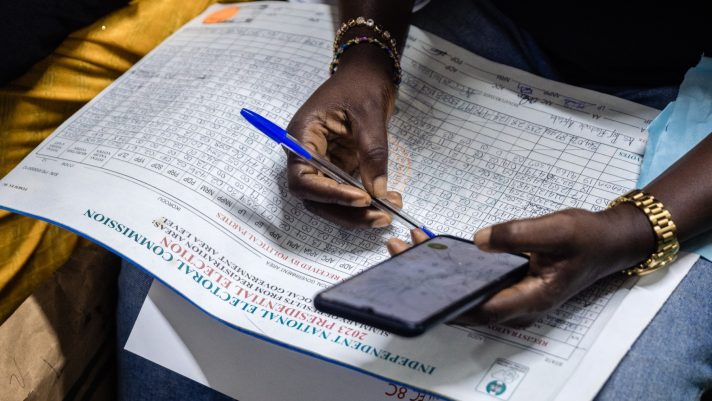By Ikeddy IZIGUZO
THE result of the presidential election brought me to a halting realisation of how little I appreciated Nigeria. Maybe, I did not understand Nigeria at all. The next phase was that I detached myself from the hullabaloo and refused to be drawn into it.
Many Nigerians are going through turns and tumbles of emotions over the results. They are entitled to their reactions. I hope they are contained within legal limits of expressing those emotions.
“Go to court”, as some mock those who mourn over the shadowy processes that produced the results does not settle anything. Of course, people would go to work. Still, there are questions
What happened to BVAS which was presented as the Titanic – unsinkable? Which icebergs hit INEC’s beloved vessel on its first major trip. There are causes for concerns.
People are expressing themselves as loudly as they can. Should anyone blame them?
On 23 November 2022, Prof Mahmood Yakubu, Chairman of the Independent National Electoral Commission, INEC, told the Civil Society Situation Room in Abuja: “On technology, the Electoral Act 2022 requires the Commission to deploy the technology on Election Day for voter accreditation and the upload of polling unit results to the INEC Result Viewing (IReV) portal. These processes will be achieved through the use of the Bimodal Voter Accreditation System (BVAS). I wish to reassure Nigerians that the BVAS has come to stay as the only means of voter accreditation.
“Results from polling units will be uploaded to the IReV portal in real-time. Nigerians will view the results as they are uploaded.
“For the last two years beginning from August 2020, the Commission has published results direct from polling units in 105 off-cycle Governorship and bye-elections in real-time and the results can still be viewed on the IReV portal. The 2023 General Election will not be different.
“This should put to rest the erroneous notion that Nigerians will not have the opportunity to view polling unit results uploaded by Presiding Officers in real time on Election Day.”
One needed to quote Prof Yakubu elaborately to rest any insinuations that the public’s expectations that INEC should have uploaded the results “real-time” were misplaced.
Has real-time assumed new meanings? Does real-time still mean, “the actual time during which a process or event occurs”? Prof Yakubu should tell us.
Professor Yakubu swore by the efficiency of BVAS, knocking off every doubt to the point of convincing Nigerians that the plastic they held in their hands, PVC, was a powerful tool for expressing their electoral preferences. INEC would protect the choices Nigerians make from tampering.
INEC confessed it had time. It had rested the technology. No excuses. Thankfully, its silence is less insulting than explanations that could deepen the pains of millions who invested their trust in a new, expensive process that drained more than N350 billion from public coffers.
Anger and frustrations at the management of the 2023 elections, relief that they ever held, celebrations for those “announced” winners and those who won, have dotted the landscape.
The moments of triumphalism have drowned the expectations that the Bimodal Voter Accreditation System, BVAS, was the elixir to election rigging. And questions about why it did not work. Or did it work? There were more assurances.
INEC National Commissioner & Chairman Voter Education Committee, Festus Okoye issued a November 11 statement about the sanctity of the BVAS and the fidelity it would vest on the results of the 2023 elections.
The statement was a response to growing doubts that INEC would not use the BVAS technology for the 2023 elections.
Okoye was direct and pointed in asserting that, “The Commission has repeatedly assured Nigerians that it will transmit results directly from the polling units as we witnessed in Ekiti and Osun Governorship elections and 103 constituencies where off-cycle Governorship/FCT Area Council elections and bye-elections were held since August 2020”.
Okoye said IReV was one of the most important innovations that the Commission had deployed for the integrity of elections in Nigeria. “It is therefore inconceivable that the Commission would turn around and undermine its own innovations,” he said.
Nigerians are sad above the failure of these expectations. When they were told that the 2023 elections would be different, they could never have imagined how different. They trusted INEC again and got more battered than in previous elections.
Lives are involved. Some have been lost in election violence. A teenager reportedly committed suicide as the results were not in his candidate’s favour. He, like others, wanted proof that their candidates were beaten fairly.
Unlike others, his frustration tipped. He did not wait for the proof.
The answer to if BVAS worked cannot be “you can go to court”. If you don’t know the answer, say so. Nigerians want quick answers to what happened on 25 February 2023. They deserve candid answers.
What is clear is that how they manage the answers would be different and personal. At least, the answers could be the barest affirmation that public institutions like INEC are established to serve the public which they also owe accountability.
Finally… LET us go to the polls on 11 March even more peaceful than we were for the presidential and National Assembly elections. There is more to life than elections
.Isiguzo is a major commentator on minor issues
In this article

